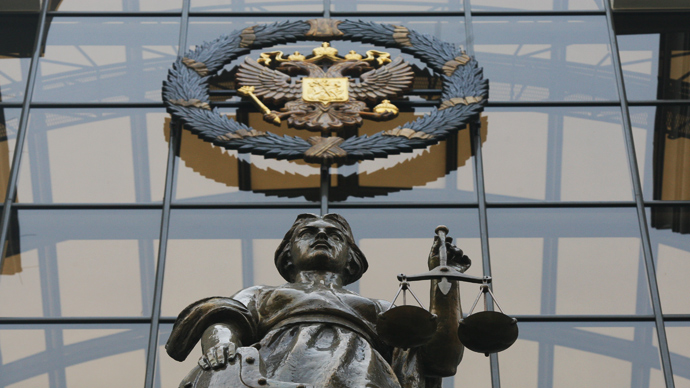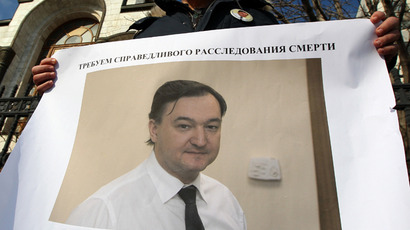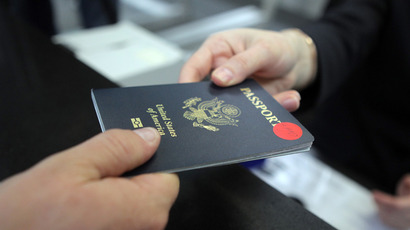Putin: Magnitsky’s death a 'tragedy,' no malice involved
President Vladimir Putin has stressed that Sergey Magnitsky’s death was not due to malicious intent. The Council of Judges also ruled the US ‘Magnitsky List’ was politicized and groundless, as the US had no access to documents relevant to the case.
"Investigators concluded that there was no malicious intent,
or criminal negligence in Magnitsky’s death. It was just a
tragedy,” Putin said in an interview with TV channel Russia-1.
"One might think no deaths occur in US prisons."
Washington published the names on the ‘Magnitsky List’ on April 12. The US has accused those named on the list of being responsible for the death of financial lawyer Sergey Magnitsky, 37, in pre-trial detention in Moscow in November 2009.
The blacklist published on the US Treasury Department's website includes the names 18 people from Russia and CIS countries who are banned from entering the US, and whose assets were frozen under the Sergey Magnitsky Rule of Law Accountability Act of 2012.

The Council of Judges in Moscow examined the decision to publish the list, and to include the names of Russian judges connected to the Magnitsky trial. “There was no reason for US to include the Russian judges on the list,” the Council concluded.
“We strongly criticized this so-called ‘Magnitsky List.’ …It unfairly tarnished the credibility of the Russian judiciary and specifically the reputation of each of the judges who made the decision in the case,” Deputy Chair of the Moscow City Court Galina Agafonova told reporters.
Agafonova questioned Washington's evidence, since “all of the documents surrounding Magnitsky’s case are still in court” and have never been made public. "I believe that this story is political and the justice system has absolutely nothing to do with it. We support our colleagues’ decisions and believe that they followed the law,” she added.
‘US list violates international law’
Russian officials on the ‘Magnitsky list’ have vowed that the blacklist's publication was politically motivated and not objective, RT’s Madina Kochenova reported.
Moscow’s position on the matter was summed up by Interior Affairs chief Vladimir Kolokoltsev: “The decisions taken by foreign governments will not carry any legal consequences for Russian citizens.” Kolokoltsev went on to thank the investigators, and told them that the US publication will have no impact on their reputation or life, since the Magnitsky List has no legal authority in Russia, and only represents an attempt at political pressure.
"The fact that I am included will have no effect on my life, I do not have a passport or any assets in US or outside of Russia," investigator Oleg Silchenko told reporters, adding that he believes the list “violates basic international laws.”
"The Magnitsky List is an attack on the part of William Browder [head of the UK-based Hermitage Capital fund], who a Moscow court has authorized the arrest in absentia after he refused to cooperate with the Russian investigation,” Silchenko said.
Investigators suspect that Browder, a US-born businessman with UK citizenship, masterminded a stock-buying scheme that cost Russia at least 3 billion rubles (over $100 million). His company allegedly used several Russian firms registered in tax havens to purchase shares of the natural gas monopoly Gazprom for foreign investors between 2001 and 2004.

According to investigators, Browder never received clearance from the Russian Federal Commission for Securities for the move. Investigator Natalia Vinogradova, also included on the list, said that she has never been abroad and believes the Magnitsky List is a “complete sham and has no legal basis here in Russia."
In response to the Magnitsky List, Russia has released a list naming 18 US citizens banned from entering the Russian Federation over alleged human rights violations. The Russian list consists of two parts: The first names those involved in human rights violations and legalized torture at the Guantanamo detention facility, and the second names those responsible for human rights violations against Russian citizens abroad.
There are reports that both the Russian and US lists are only short versions, and that an extended version of the US list includes some high-level Russian government officials that could not be revealed over security concerns.
The Magnitsky Act
The US law – also known as the Magnitsky Act – imposes visa bans and asset freezes on Russian officials allegedly involved in Magnitsky's death and other human rights abuses in Russia. Top Russian officials have repeatedly blasted the Magnistky Act as an attempt to subvert the laws of a sovereign country, and as exploiting a human tragedy for political ends.
The original version of the Magnitsky List included 60 names, with some proposing to extend it to some 280 blacklisted citizens of Russia. The latest – and the largest – version was handed to the Obama administration by Representative James P. McGovern, who threatened to lobby for a harsher law if the White House refuses to enact the existing list.

At the time of his death, Magnitsky worked for British investment fund Hermitage Capital, headed by William Browder. In 2007, the company became embroiled in a wide-ranging tax evasion scandal. Magnitsky, who insisted that the money had been embezzled by a group of security service and tax officials, was arrested on suspicions of assisting the firm with evading taxes, and housed in a Moscow detention center to await trial.
In November 2009, almost a year after his initial detention Magnitsky died of what medics identified as a heart attack. His family demanded an investigation into the circumstances of his death, claiming he had been denied medical help. Magnitsky supporters claimed that he had been tortured to extract a confession and to withdraw his accusations.
In March 2013, the criminal case into Magnitsky's death was closed due to the “absence of a crime,” Russia’s Investigative Committee said. Magnitsky’s family said they will appeal the decision.














